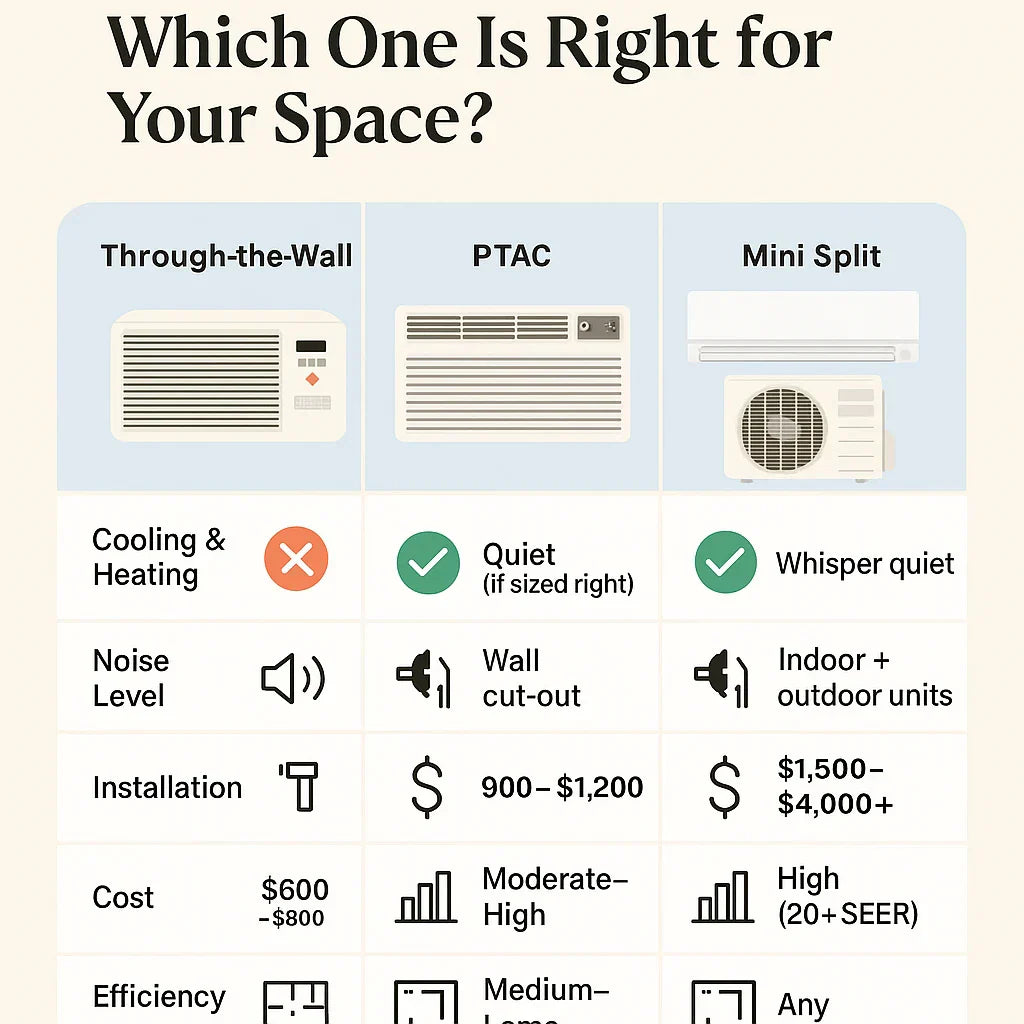When you're trying to cool a room without traditional ductwork, three options tend to rise to the top: through-the-wall air conditioners, PTAC units, and ductless mini split systems. Each has its own strengths, weaknesses, and best-use scenarios. But which one is right for your space?
In this guide, we’ll compare these compact HVAC systems across installation, cost, energy efficiency, comfort, and more—so you can make the most informed choice for your budget and comfort goals.
🛋️ What Is a Through-the-Wall Air Conditioner?
A through-the-wall (TTW) AC is a self-contained unit that slides into a sleeve permanently installed in your wall. Unlike window units, they don’t block your view or pose a security risk.
✅ Pros:
-
Easy to install in existing wall sleeves
-
Lower cost ($600–$800 on average)
-
Good for smaller rooms
❌ Cons:
-
Cooling only (typically)
-
Louder than mini splits
-
Less efficient in extreme climates
Best For:
-
Small bedrooms
-
Apartments
-
Budget-conscious cooling needs
🏨 What Is a PTAC Unit?
PTAC stands for Packaged Terminal Air Conditioner. These units combine cooling and heating (via heat pump or electric resistance) and are mounted directly through the wall. They’re common in hotels but increasingly popular in residential settings.
Example: GE Zoneline 15,000 BTU PTAC with Heat Pump
✅ Pros:
-
Heating + cooling in one unit
-
Built-in thermostat and controls
-
Quiet operation (especially GE Zoneline)
-
Cost-effective for larger rooms
❌ Cons:
-
Requires large wall cutout
-
May need a dedicated 208/230V circuit
-
Slightly bulkier than TTW units
Best For:
-
Guest suites
-
Studio apartments
-
Finished basements
🌀 What Is a Ductless Mini Split System?
Mini split systems use one or more wall-mounted indoor air handlers connected to an outdoor condenser via refrigerant lines. They’re flexible, powerful, and incredibly efficient.
✅ Pros:
-
Best-in-class efficiency (SEER 20+)
-
Zoned cooling (multi-room options)
-
Whisper-quiet indoor units
-
Rebates and tax credits often available
❌ Cons:
-
Highest upfront cost ($2,000–$5,000+ installed)
-
Most units require professional installation (DIY only for MRCOOL)
-
Requires outdoor space for condenser
Best For:
-
Whole-home retrofits
-
Multi-zone comfort control
-
Allergy-sensitive households (with multi-stage filtration)
⚖️ Feature-by-Feature Comparison
| Feature | Through-the-Wall | PTAC | Mini Split |
|---|---|---|---|
| Heating & Cooling? | ❌/✅ | ✅ | ✅ |
| Noise Level | Moderate | Quiet (Zoneline) | Whisper quiet |
| Installation | Wall sleeve | Wall cut-out | Indoor + outdoor |
| Cost | $600–$800 | $900–$1,200 | $2,000–5,000+ |
| Efficiency (EER/SEER2) | Moderate | Moderate–High | Very High |
| Room Size | Small–Medium | Medium–Large | Any |
🪩 Matching the Right System to Your Space
-
🏠 Small Bedroom (200–400 sq. ft) → Through-the-Wall or Mini Split
-
🏡 Living Room (500–800 sq. ft) → PTAC or Mini Split
-
🏢 Garage or Sunroom → PTAC or Mini Split
-
🌍 Studio Apartment → PTAC
-
🏦 Whole Home (Multi-zone) → Mini Split
💸 Cost Breakdown: Upfront vs. Long-Term
| System Type | Typical Install Cost | Monthly Energy Cost | Efficiency Over Time |
| TTW | Low | Moderate | Decent |
| PTAC | Medium | Moderate | Good |
| Mini Split | High | Low | Excellent |
Many homeowners qualify for utility rebates when installing a high-efficiency mini split.
🛠️ Installation & Maintenance
-
TTW AC: Easiest to install; just slide into wall sleeve
-
PTAC: Requires sleeve and weather-sealing; may need electrician
-
Mini Split: MRCOOL DIY = homeowner-friendly; others = professional only
Maintenance Tip: All units require regular filter cleaning and seasonal checkups to maintain efficiency.
📌 Final Thoughts: Which System Is Best for You?
-
On a tight budget or retrofitting a single room? → Through-the-Wall
-
Need heat + cool and a clean look? → PTAC
-
Want max comfort and efficiency for multiple rooms? → Mini Split
When in doubt, look at your space, your power supply, and your climate. For many homeowners, the GE Zoneline PTAC strikes the ideal balance of power, quiet operation, and price—especially in rooms between 400–800 sq. ft.
🔗 External Resources
Need help deciding between the GE Zoneline and other cooling options? Drop your room size and usage in the comments, and we’ll point you to the best solution for your comfort and budget!.
In the next topic we will know more about: Can the GE Zoneline Handle Both Heating and Cooling Year-Round?







